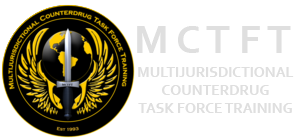During this hour-long broadcast, instructors from the Federal Law Enforcement Training Center’s (FLETC) Computer and Financial Investigations Division and computer forensics investigators will demystify digital evidence by showing you how drug dealers and users utilize computers. Learn the best ways to get a search warrant, the basics of what to do and what NOT to do at a scene, and how pre-planning can make your investigation a whole lot easier.
Learning Objectives:
- Learn what verbiage to use in a search warrant
- See what to do and what not to do at a scene
- Discover what evidence you should take with you and how to safely remove it from the scene
Originally Aired: April 26, 2007
Panelists
Ed Hewitt
Retired Detective, Vancouver, WA, Police Department’s Major Crimes Unit for White Collar Crimes, owner of Financial SafeGuards, LLC
During his 31 years of combined law enforcement and private sector business management & investigative experience, Hewitt has successfully spearheaded numerous large and complicated investigations into cases involving organized crime, identity theft, insurance & investment fraud, internet fraud, and corporate and nonprofit embezzlement. He is considered an expert about identity theft and internet crime. Hewitt holds a BS from Washington State University in Police Science and Administration and retired from police work in July 2005 to start his own consulting, investigations and training company, headquartered in Eagle, ID, known as Financial SafeGuards, LLC.
Robert ‘Doc’ Gardner
PhD, Lakeland Police Department
Dr. Gardner is currently serving in the Investigative Services Division, Special Investigations Section, of the Lakeland Police Department in Florida. He has been in law enforcement since 1986 and is currently in command of the Criminal Intelligence Unit, which includes basic intelligence functions, investigations of computer and digital media crimes, anti-terrorism, homeland security, gang interdiction and suppression, and surveillance/countersurveillance operations. Dr. Gardner is a Certified Computer Forensics Examiner by the International Association of Computer Investigative Specialists (IACIS). His prior investigative assignments as a detective have included criminal intelligence, narcotics, and vice operations, and he is a former Special Agent of the Federal Bureau of Investigation, where he was assigned as a criminal investigator. Dr. Gardner earned his PhD in criminology from Virginia Tech. He has been teaching in this field for 22 years and has served on the criminal justice and criminology faculty at several universities and colleges. In addition to his academic credentials, he is certified by the State of Florida Criminal Justice and Standards Training Commission as a police instructor, firearms instructor, defensive tactics instructor, and police/emergency vehicle driving instructor. He has assisted with in-service training for his agency and has served as an instructor for the regional criminal justice academy.
Matthew Shoaf
Program Coordinator and Senior Instructor of the Internet Investigations Training Program and the Cyber Counterterrorism Investigations Training Program at the Federal Law Enforcement Training Center (FLETC)
Prior to arriving at FLETC, Shoaf previously served as a national trainer and Computer Crimes Specialist for the National White Collar Crime Center and has served in state and local law enforcement and the military for the past 22 years. He has worked as a patrol officer, training officer, supervisor and as a detective assigned to Homicide and Major Crimes. He served as the Investigations Program Manager for the Domestic Violence Enhanced Response Team and has presented nationally on domestic violence investigations, stalking and strangulation cases.
Shoaf finished up his sworn law enforcement career as a computer forensic examiner and computer crimes investigator conducting online internet crimes. He is a member of the Internet Crimes Against Children Task Force and has assisted in training numerous members of this organization. Shoaf served as a Truth Verification Examiner utilizing voice stress analysis and has conducted numerous interviews for homicides, assaults, sex offenses and crimes against children.
Shoaf has completed an Associates of Applied Science in Criminal Justice, a Bachelor’s of Science in Criminal Justice, and is finishing up a Masters in Homeland Security.

